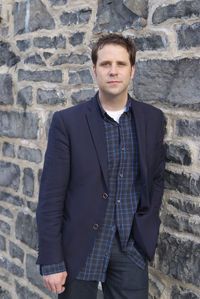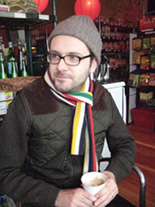Different Demands: Lee Henderson
in Conversation with John Goldbach

Malahat fiction board member and UVic Department of Writing professor Lee Henderson talks with Montreal novelist and short story author John Goldbach, using his story, “Sigismund Mohr: The Man Who Brought Electricity to Quebec,” which appears in Issue #191 (Summer 2015), as a launch pad for a more general discussion of writing historical fiction as well as John’s recommended reading.
What about the subject, Sigismund Mohr, in particular, made you want to write this kind of fictionalized account of his life?
Well, for starters, there’s so little information on Sigismund Mohr—he doesn’t even have a Wikipedia page, for instance—and he’s such a monumental figure, it seems to me, and fascinating; the subject of electricity and energy’s fascinating in its own right but this figure from Breslau arriving in Montreal and then transporting his family to Quebec City, where he’d one day bring hydroelectric power, harnessing waterpower from nearby Montmorency Falls, seems amazing to me, a man performing wizardry, and there’s virtually nothing on Mohr, which is strange and suspect, almost like the historical record’s been redacted, though that sounds paranoid and dramatic. But, for example, Conrad Black’s recently published, 1120-page history, Rise to Greatness: The History of Canada From the Vikings to the Present (McClelland & Stewart, 2014), makes no mention of Mohr, an odd omission, and, again, this man brought electricity to Quebec, which was the model for hydroelectricity for the rest of the country. Mohr died of pneumonia two weeks after he went out during a snowstorm to fix one of his power lines that was down. He wasn’t a ruthless entrepreneur but an obsessive inventor—a real visionary, so to speak. Also, he was the first to use Tesla’s alternating current, for the purposes of powering a downtown core. He appears relevant to me now, as energy’s an ever-growing concern. Lastly, he died on December 15, 1893; I was born December 15, 1978. I’m not drawing any mystical connections but it was enough to keep me intrigued and want to learn more about Mohr and write a sort of fictional biography of him.
When you're writing about a real person or event, what sort of obligations and responsibilities do you feel to the art of fiction and then also to the facts in the historical record?
If I were writing about someone very well known—like Elvis or Richard Nixon or Mao Zedong, for example—I don’t know how much responsibility I’d feel to the facts in the historical record or verisimilitude in general. There’s a lot of great fiction that bends the historical record to its will, of course, with wonderful results. But with this story, writing about Mohr, a virtually unknown figure, I’ve tried to at least include the facts that are known about him. I think the fiction writer should disregard the record when it serves their purposes to do so. And those purposes are to attempt to write interesting fiction. But with Mohr, due to the dearth of information on him, I had no choice but to make some things up. There were many gaps in the record to fill in. And as much as I want to introduce Mohr to people who haven’t heard of him, the sentences and diction come first—and of course the desire to tell a good story.
This story is pretty different from your previous stories and your novel. But then again, they're all quite different from one another, too. The stories in Selected Blackouts are mostly set in the contemporary but are still highly varied in style and point of view, and your novel The Devil and the Detective is a kind of metaphysical mystery working on another level entirely. What's your process like for developing such a specific voice?
Different stories have different demands, it seems, so in order to get into a story, into the subject matter and language, I’ll read books that I think are related, even tangentially, if it could maybe help me get the writing down. For example, while writing this story, due to the lack of information on Mohr—though I read everything I could find—I found myself reading writings around the subject and 19th-century books that appealed to me and seemed related, in a general way, amongst other things, like Dickens’s American Notes, his notebooks from his 1842 trip to North America; he visited Montreal and Quebec City, which he found tremendously beautiful and the city left a lasting impression on him: “The impression made upon the visitor by this Gibraltar of America: its giddy heights; its citadel suspended as it were in the air; its picturesque steep streets and frowning gateways; and the splendid views which burst upon the eye at every turn: is at once unique and lasting. It is a place not to be forgotten or mixed up in the mind with other places or altered for a moment in the crowd of scenes a traveller can recall. Apart from the realities of this most picturesque city, there are associations clustering about it which would make a desert rich in interest.” (I agree!)
Tesla’s My Inventions and Other Writings is an amazing read. And there were books on Hydro Quebec, too, that were sort of useful—that is, in terms of getting me thinking about the subject matter at hand. But, most of all, it seems to me, that when attempting to do different types of stories, that is, ones that are somewhat different in style than the ones that came before, nothing’s more useful than time, that is to say, time to think about the subject matter and feel one’s way into the story, which is why this story about Sigismund Mohr took a while for me to write, from conception to any sort of realization—it took me a while to find the right way to write it, that is what felt right to me, and I don’t think I was ready to write it when I first got the idea, approximately seven years ago, in 2008, the year of Quebec City’s 400th anniversary; nevertheless, I kept thinking about Mohr and Quebec City, while reading stories and documents I thought would prove helpful.
I know you're a voracious reader. I don't know many people who read more or more widely than you. Do you have any recommendations?
I recently read Iris Owens’s After Claude (NYRB Classics, 2010) for the first time and I know I’ll read it again. It’s a very funny, brutal and wonderful novel. It’s one of the great breakup novels, too, like Elena Ferrante’s The Days of Abandonment, and it’s really raucous, like virtuosic jazz drumming, with a shift from autobiographical confession to wild surreality, and it works! Also, somewhat apropos of these questions and the Mohr story, I’ve been reading Plutarch’s Lives; I’d read some of his biographical portraits in the past in a very abridged collection—the Greek and Roman lives are often separated, which isn’t the way he intended them to be presented—but now I’ve decided to read the Modern Library’s two volume set. And they’re amazing, not surprisingly, and in this format the famous Greeks and Romans are compared to each other, revealing, in most cases, parallels. As far as biography goes, this is the stuff! And of course Plutarch took liberties, too, so there’s a semi-fictionality to the portraits, which really interests me. This September, also, Croatian-born US/Canadian author Josip Novakovich has a new collection of stories coming out with the Esplanade Books line at Véhicule Press, Ex-Yu, his first collection of stories since being named a finalist for the 2013 Man Booker International Prize, and it’s really great. Definitely a book to look forward to.
Are you working on any other projects at the moment?
Right now I’m working on a longish story, the last story of the collection I’ve been working on (i.e., not necessarily the last story in the table of contents but I think it’ll be the last story that makes the collection, if it works out), so I’ll see what happens. Hopefully it works!

Lee Henderson
* * * * * * * *









